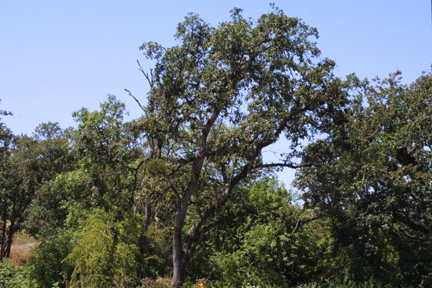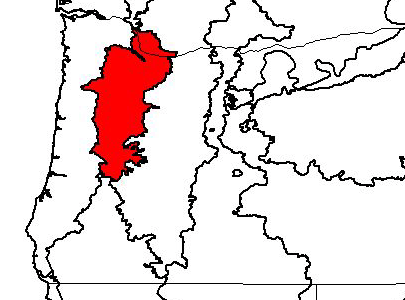
Oaks, central Oregon (c) 2005 Steven J. Baskauf
Bioimages home (click on an image to enlarge)
view
this page in its intended navigation context
Willamette Valley forests
(WWF
ecoregion NA0417)

Oaks, central Oregon
(c) 2005 Steven J.
Baskauf

Source of bioregions data:
Olson, D. M. and
E. Dinerstein. The Global 200: Priority ecoregions for global conservation. (PDF
file) Annals of the Missouri Botanical Garden 89:125-126.
Distinctiveness (1=highest,4=lowest): 3 (bioregionally
outstanding)
The Willamette Valley once contained a prairie with oak savannas and groves of
Douglas fir.*
Conservation Status (1=most endangered, 5=most
intact): 1 (critical)
Less than one percent of the habitat remains intact. Nearly all of the
region has been converted to agriculture or has been urbanized. Fire
suppression has contributed to the loss of prairie and the conversion of savanna
to forest.*
 | Quercus garryana | (Oregon white oak) |
 | Pseudotsuga menziesii | (Douglas fir) |
 | Populus trichocarpa | (black cottonwood) |
Associated habitats



oak savanna with heavily impacted grasslands,
Oregon (c) 2005 Steven J. Baskauf
hires
hires
hires



remnant riparian woodland adjacent to cultivated field,
Oregon (c) 2005 Steven J. Baskauf
hires
hires
hires




mixed hardwoods and conifers, southern
Willamette Valley, Oregon (c) 2005 Steven J. Baskauf
hires
hires
hires
hires
* Ricketts, T.H., E. Dinerstein, D.M. Olson, C.J. Loucks, et al. (1999) Terrestrial Ecoregions of North America: A Conservation Assessment. World Wildlife Fund - United States and Canada. Island Press, Washington, D.C. pp. 154-155.
Except as noted, images copyright 2002-2005 Steve Baskauf - Terms of use